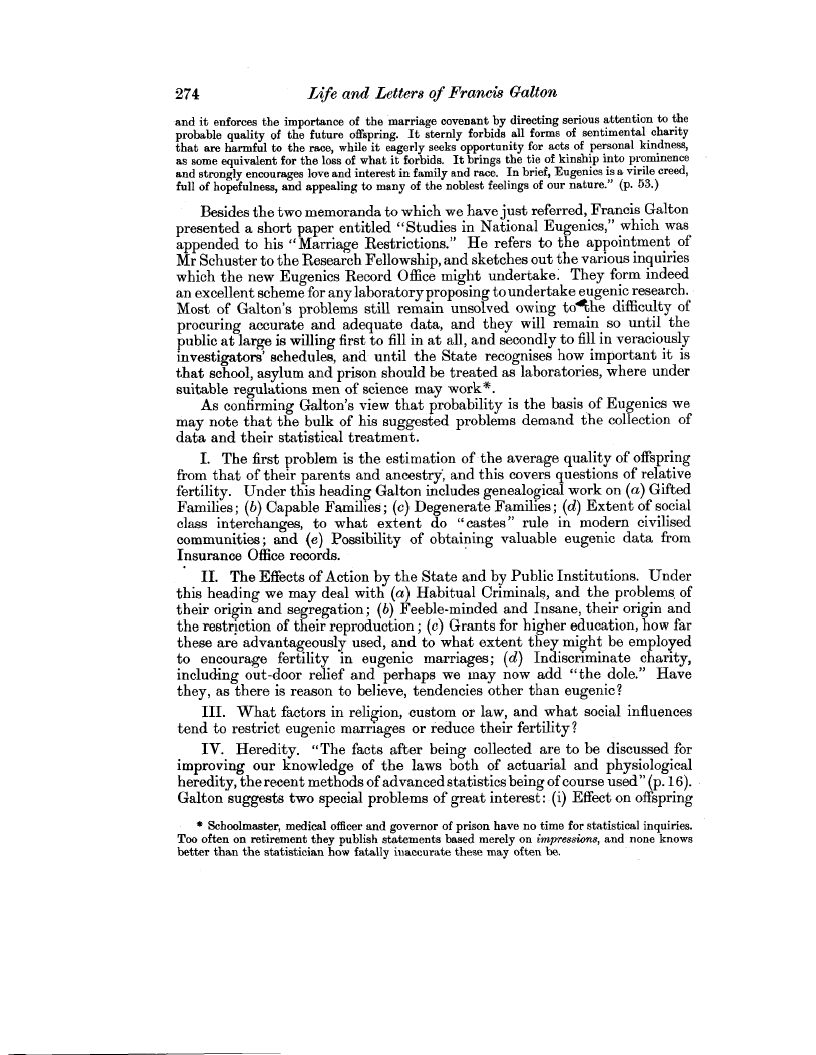| ||||||

OCR Rendition - approximate
274 Life and Letters of Francis Galton and it enforces the importance of the marriage covenant by directing serious attention to the probable quality of the future offspring. It sternly forbids all forms of sentimental charity that are harmful to the race, while it eagerly seeks opportunity for acts of personal kindness, as some equivalent for the loss of what it forbids. It brings the tie of kinship into prominence and strongly encourages love and interest in family and race. In brief, Eugenics is a virile creed, full of hopefulness, and appealing to many of the noblest feelings of our nature." (p. 53.) Besides the two memoranda to which we have just referred, Francis Galton presented a short paper entitled "Studies in National Eugenics," which was appended to his "Marriage Restrictions." He refers to the appointment of Mr Schuster to the Research Fellowship, and sketches out the various inquiries which the new Eugenics Record Office might undertake. They form indeed an excellent scheme for any laboratory proposing to undertake eugenic research. Most of Galton's problems still remain unsolved owing to'Rthe difficulty of procuring accurate and adequate data, and they will remain so until the public at large is willing first to fill in at all, and secondly to fill in veraciously investigators' schedules, and until the State recognises how important it is that school, asylum and prison should be treated as laboratories, where under suitable regulations men of science may work*. As confirming Galton's view that probability is the basis of Eugenics we may note that the bulk of his suggested problems demand the collection of data and their statistical treatment. I. The first problem is the estimation of the average quality of offspring from that of their parents and ancestry, and this covers questions of relative fertility. Under this heading Galton includes genealogical work on (a) Gifted Families ; (b) Capable Families ; (c) Degenerate Families ; (d) Extent of social class interchanges, to what extent do "castes" rule in modern civilised communities; and (e) Possibility of obtaining valuable eugenic data from Insurance Office records. II. The Effects of Action by the State and by Public Institutions. Under this heading we may deal with (a) Habitual Criminals, and the problems. of their origin and segregation; (b) Feeble-minded and Insane, their origin and the restriction of their reproduction ; (c) Grants for higher education, how far these are advantageously used, and to what extent they might be employed to encourage fertility in eugenic marriages; (d) Indiscriminate charity, including out-door relief and perhaps we may now add "the dole." Have they, as there is reason to believe, tendencies other than eugenic? III. What factors in religion, custom or law, and what social influences tend to restrict eugenic marriages or reduce their fertility? IV. Heredity. "The facts after being collected are to be discussed for improving our knowledge of the laws both of actuarial and physiological heredity, the recent methods of advanced statistics being of course used" (p. 16). Galton suggests two special problems of great interest: (i) Effect on offspring * Schoolmaster, medical officer and governor of prison have no time for statistical inquiries. Too often on retirement they publish statements based merely on impressions, and none knows better than the statistician bow fatally inaccurate these may often be.
|